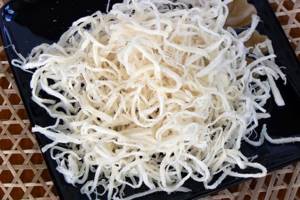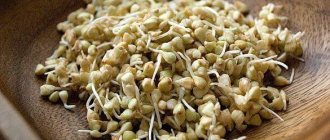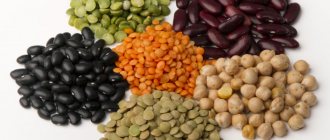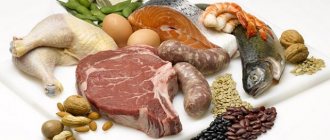Calorie content
Squid meat has excellent taste, high nutritional value and healing properties.
That is why this mollusk is called “sea ginseng”. The benefits of squid are due to the many nutrients and vitamins it contains:
- Protein;
- Vitamins C, B1, B2, B6, B9, PP, E;
- Polyunsaturated fats.
Squid contains a huge amount of micro- and macroelements important for human health:
- Phosphorus;
- Iron;
- Copper;
- Iodine;
- Potassium;
- Calcium;
- Sodium;
- Magnesium;
- Nickel;
- Zinc;
- Selenium.
The iron and potassium content in squid supports normal heart function. In addition, white squid meat contains absolutely no cholesterol. Iodine is essential for humans to maintain a healthy thyroid gland and the endocrine system as a whole. The selenium content in squid is particularly beneficial: it helps remove heavy metal salts from the body.
The undoubted benefit of squid is that, thanks to the components in its composition, you can effectively influence the level of cholesterol in the blood (if it is exceeded). And this is a good prevention against heart and blood vessel diseases. Many beneficial substances in squid meat make blood vessels more elastic, and this increases their strength and ability to narrow.
The benefit of squid also lies in the fact that, thanks to the proteins contained in shrimp and squid, their consumption well supports and improves the development of muscle tissue. These properties and the high calorie content of squid make this meat an excellent product for consumption by those people who aim to build muscle (athletes, bodybuilders).
The nutritional value, along with the high calorie content of squid, has an excellent effect on the condition of the digestive system. Shrimp and squid are perfectly absorbed by the body without creating heaviness in the stomach. Metabolic processes in the body proceed normally, since there are no purine compounds in squid meat.
Doctors consider the significant benefits of squid to be their ability to stimulate mental activity and improve memory. Thanks to selenium and vitamin E, the benefits of squid are due to their diuretic function, which stimulates the rapid removal of toxins from the body. And in this case, the genitourinary system is significantly strengthened.
Thus, the benefits of squid are represented by a whole list of beneficial effects on the human body:
- Anti-sclerotic;
- Strengthening the heart muscle;
- Endocrine system support;
- General strengthening;
- Removal of waste and toxins;
- Strengthening blood vessels;
- Improved digestion;
- Diuretic.
The calamari content of squid is relatively low, which sets it apart from other types of meat, and at the same time it is satisfying and tasty. So, the calamari content of squid is 100 kilocalories per 100 grams of meat.
Indicators of nutritional value of squid, in the overall composition of the product:
- Proteins – 18%;
- Fats – 2.2%;
- Carbohydrates – 2%.
It has been scientifically established that the benefits of seafood such as squid and shrimp are higher in many respects than any other meat, even turkey and beef.
The low calorie content of squid allows this seafood to be used as a dietary product, since it contains a large amount of protein and virtually no fat.
The nutritional value and calorie content of fried squid per 100 g of seafood is:
- Lipids – 7 g;
- Saturated fat – 1.9 g;
- Cholesterol – 260 mg;
- Sodium – 306 mg;
- Potassium – 279 mg;
- Carbohydrates – 8 g;
- Calorie content of fried squid – 175 kcal;
- Dietary fiber – 0 g;
- Proteins – 18 g;
- Vitamin C – 4.2 mg;
- Calcium – 39 mg;
- Iron – 1 mg;
- Vitamin B6 – 0.1 mg;
- Vitamin B12 – 1.2 mg;
- Magnesium – 38 mg.
The nutritional value and calorie content of boiled squid per 100 g of seafood is:
- Cholesterol – 244 mg;
- Sodium – 294 mg;
- Lipids – 5.2 g;
- Potassium – 264 mg;
- Carbohydrates – 1.59 g;
- Water – 21.29 g;
- Saturated fat – 2.37 g;
- Polyunsaturated fatty acids – 1.8 g;
- Monounsaturated fatty acids – 2.5 g;
- Calorie content of boiled squid – 98.26 kcal;
- Dietary fiber – 0 g;
- Proteins – 17.22 g;
- Vitamin C – 4.02 mg;
- Calcium – 37 mg;
- Iron – 0.08 mg;
- Vitamin B6 – 0.07 mg;
- Vitamin B12 – 1.02 mg;
- Magnesium – 34 mg.
The nutritional value and calorie content of dried squid per 100 g of seafood is:
- Cholesterol – 286.7 mg;
- Sodium – 332 mg;
- Lipids – 5.4 g;
- Potassium – 306 mg;
- Carbohydrates – 1.88 g;
- Water – 0 g;
- Saturated fat – 1.71 g;
- Polyunsaturated fatty acids – 1.4 g;
- Monounsaturated fatty acids – 2.3 g;
- Calorie content of dried squid – 245.06 kcal;
- Dietary fiber – 0 g;
- Proteins – 53.32 g;
- Vitamin C – 4.45 mg;
- Calcium – 39.2 mg;
- Iron – 1.1 mg;
- Vitamin B6 – 0.11 mg;
- Vitamin B12 – 1.22 mg;
- Magnesium – 38.3 mg.
Everyone knows about the low energy value of this seafood. In its raw form, it is indeed low in calories, but the final value depends on how you cook it. So, here are the most common options for serving shellfish and its nutritional value per 100 grams:
- Raw – 92 kcal.
- Canned – 95 kcal.
- Stewed – 97.6 kcal.
- Boiled – 122 kcal.
- Fried – 174.6 kcal.
- Torn – 181 kcal.
- In batter – 188.8 kcal.
- Dried – 237 kcal.
- Smoked – 242 kcal.
- Dried - 248.6 kcal.
As you can see, the figures vary greatly. They should be taken into account by those losing weight. If you want to lose weight, then it is advisable to boil or stew shellfish, or at least fry them.
Characteristics, composition and calorie content
What makes squid meat valuable is its low energy value, as well as its chemical composition (although not too rich, but balanced). The calorie content of seafood directly depends on the method of its preparation: stewing, boiling, smoking, frying. Thus, the calorie content of raw squid per 100 g is 91 kcal, but depending on cooking, the number of calories changes as follows:
- boiled squid – 99.5 kcal;
- grilled – 106.5 kcal;
- canned – 104.9 kcal;
- fried in a frying pan in oil – 175.6 kcal;
- stewed in its own juice – 174.8 kcal;
- smoked – 241.3 kcal;
- Dried squid is the highest in calories, containing 285.7 kcal per 100 g serving.
The nutritional value and chemical composition are not particularly varied and extensive due to the fact that squid is 80% water. The ratio of proteins, fats and carbohydrates is 18/2.1/2, respectively. It is thanks to its high protein content that squid occupies a leading position among dietary products and is suitable for the diet of athletes and people who adhere to the principles of a healthy diet.
Despite the high liquid content in the composition, the product is rich in vitamins such as B4, C and B3. Squid contains slightly smaller quantities of vitamins A, E and B12. The complex of these elements has pronounced antioxidant properties, due to which the aging process in the body slows down and cell regeneration accelerates.
In addition, seafood meat contains a variety of macro- and microelements, such as:
- phosphorus;
- sodium;
- potassium;
- magnesium;
- copper;
- iron;
- selenium;
- zinc;
- manganese.
The chemical composition is supplemented with amino acids necessary for the human body (essential and essential), especially important in the process of losing weight or during physical activity. Thanks to the taurine contained in squid, cholesterol levels in the blood are reduced.
Another distinctive feature is the content of a large amount of animal protein. According to this indicator, squid is not inferior to beef or fish.

© bodiaphoto — stock.adobe.com
However, in order to make squid meat tasty and preserve its beneficial properties during the cooking process, you need to be able to cook it correctly. Boil it in hot water for 3 or 4 minutes, but no more, otherwise the product will become rubbery. Moreover, you can cook it in its entirety along with the tentacles, but first cut off the head and clear the cavity of the entrails.
If cooked correctly, boiled squid will fully retain its beneficial properties.
Description
Squids belong to the order of cephalopods. Their bodies are torpedo-shaped. The coloring of squids can be absolutely diverse. These creatures are predators by nature, feeding on anything they can catch with their tentacles, from plankton to deep-sea fish.
Squid are caught in the Sea of Okhotsk, as well as in the seas of Japan, Vietnam, China, on the Patagonian shelf, in Peru and Ecuador.
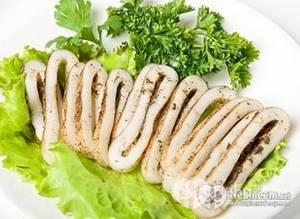
The edible part of the squid makes up 60–80% of the total weight, but during cooking the product loses up to 40% of its weight.
In its chemical composition, this product is very similar to lean fish. Squid meat consists of several layers of fibers running transversely to each other and covered with several layers of connective tissue.
BJU
But now we can answer the question of how much protein is in squid. The carcass of this mollusk is a real treasure. The ratio in the raw BJU product per 100 grams is as follows:
- Proteins – 18 g.
- Fats – 2.3 g.
- Carbohydrates – 0.14 g.
You can very simply answer the question “How much protein is in squid?” – there’s a lot of it there. 100 grams of this product is enough to cover more than ¼ of the daily requirement of an adult.
Interestingly, the ratio changes after the shellfish is cooked. It is unlikely that anyone will want to eat it raw, and therefore you also need to find out how much protein is in boiled squid. In this dish the ratio of BJU is as follows:
- Carbohydrates – 2 g.
- Fats – 2.8 g.
- Proteins – 17.88 g.
The initial composition of the product does not change much after cooking, unlike frying. If you place the mollusk in a greased frying pan, the data will be completely different. Carbohydrates and fats will increase significantly, and how much protein will be left in the squid? A little over 15 g.
Calamari content: nutritional and energy value of seafood
The calorie content of boiled squid (per 100 g) is 110 kcal. This seafood often becomes the basis of dietary dishes, but at the same time it saturates the body well, making it possible to satisfy the feeling of hunger for a long time.
Boiled squid (per 100 g) contains 18 g of protein and 4.2 g of fat. Carbohydrates are not found in such a product, so the product often becomes the basis of the diet during a protein diet.
In general, the indicators of the BJU of boiled squid allow us to conclude that this product is safe for the figure and very nutritious due to the fact that it contains more protein than fats or carbohydrates.
Content:
- Calamari content depending on the method of preparation
- What are the benefits of squid?
- Delicious and nutritious!
- Harm from squid
- Warning: Potential danger!
Squid is a seafood that almost everyone likes.
Its excellent taste characteristics are complemented by exceptionally beneficial properties. Squids contain a lot of B vitamins, vitamin C, PP and E. They contain a lot of micro- and macroelements, including iron, manganese, sulfur, calcium, zinc. Squids are exceptionally rich in potassium, iodine, phosphorus and copper. Cephalopod meat is a source of easily digestible protein, polyunsaturated fats, valuable amino acids and biologically active substances.
Chemical composition
In addition to the BJU indicators of boiled squid, it is also necessary to study its composition of chemical substances, which ensure the health benefits of the product. To understand what vitamins and elements are contained in the product, it is worth considering the table below.
| Substance | Content per 100 g of product |
| Vitamin A | 10.1 mcg |
| Retinol | 0.011 mg |
| Vitamin B2 | 0.09 mg |
| Vitamin B4 | 0.07 g |
| Vitamin B5 | 0.5 mg |
| Vitamin B6 | 0.18 mg |
| Vitamin B9 | 12 mcg |
| Vitamin B12 | 1.4 mcg |
| Vitamin C | 0.0015 g |
| Vitamin E | 0.002 g |
| Magnesium | 0.09 g |
| Potassium | 0.28 g |
| Sodium | 0.12 g |
| Sulfur | 0.155 g |
| Phosphorus | 0.25 mg |
| Iron | 1.12 mg |
| Cobalt | 95 mcg |
| Calcium | 0.041 g |
| Manganese | 0.171 mg |
| Copper | 1500 mcg |
| Nickel | 11.0 mcg |
| Iodine | 300.0 mcg |
| Selenium | 45.0 mcg |
| Zinc | 1.81 mg |
| Cholesterol | 0.085 g |
| Omega-3 | 0.70 g |
| Omega-6 | 0.03 g |
It was said above how much protein is in squid. 100 grams of shellfish are rich not only in the high content of this substance, but also in many other valuable elements. Among them:
- Vitamin B3 – normalizes sugar levels.
- Lysine – has a positive effect on vision and improves well-being.
- Taurine – stimulates performance, prevents the formation of cholesterol plaques, improves liver function.
- Polyunsaturated fatty acids - normalize the functioning of all organs and strengthen the body's defenses.
- Copper – prevents the formation of anemia and hair loss.
- Iodine – accelerates metabolic processes, has a positive effect on the functioning of the thyroid gland.
- Selenium – removes free radicals and heavy metal salts from the body, minimizes the likelihood of developing arthritis.
- Potassium – stabilizes blood pressure, accelerates mental activity.
- Zinc – narrows the range of diseases dangerous to the body.
- Magnesium – reduces muscle spasms and has a positive effect on the central nervous system.
- Phosphorus – strengthens teeth and bones.
There is no doubt about the benefits of shellfish for the human body. Its beneficial effects are quickly transmitted to the body, as it is absorbed phenomenally quickly. When consuming this product, gastric juice is secreted actively and abundantly, which accelerates metabolic processes.
Benefits of squid for the human body
- protein is easily digested, without causing a feeling of heaviness in the stomach, and is not stored in the form of fatty tissue;
- useful for lowering blood cholesterol levels;
- increases the production of gastric juice;
- high phosphorus content is another beneficial property of squid. This element normalizes the functioning of the thyroid gland, replenishes the lack of iodine in the body, and has a positive effect on the endocrine system;
- It is recommended to consume squid meat during frequent mental stress;
- copes well with chronic lack of sleep, normalizes the functioning of the nervous system;
- squid has a diuretic effect;
- Vitamin E, penetrating into the eyeball, accelerates metabolic and regenerative processes and can restore vision;
- due to the presence of potassium, magnesium, sodium, it will strengthen blood vessels, normalize blood flow, and have a positive effect on the functioning of the heart;
- useful for removing toxins and waste from the body;
- for inflammation of the gallbladder, a diet containing squid is prescribed;
- For men, shellfish meat will be useful to prevent problems with potency and the prostate gland. It will help restore strength during frequent physical activity, training in the gym, and will be useful for building muscle mass;
- For women, squid is no less useful: it will help normalize hormonal surges, strengthen nails and hair. Arginine (of which there is a sufficient amount in the composition) will be much more effective in rejuvenating and smoothing the skin than your favorite cream;
- Canned squid can bring no less benefit. If you like this product, it is advisable to give preference to marinade in its own juice rather than in oil;
- For a light and healthy snack, dried, dried or grilled squid is suitable, since it is in these states that it contains the greatest amount of vitamins, minerals and acids;
- Squid tentacles are also very often eaten as a snack for beer. They have the same energy and vitamin value as the squid itself. It's just a matter of taste.
Squid and diet
These two concepts are quite correlated. It is worth remembering how much protein is in 100 grams of boiled squid and that this element is the most necessary in a balanced diet. It can be used both for gaining muscle mass and for losing weight.
Squid is the best alternative to chicken breast. They contain more nutrients, but less fat. Squid is also an ideal product for adding variety to a truncated diet on strict diets. It easily fills the gaps in vitamins and minerals that the body always needs.
Plus, this seafood provides impressive scope for culinary creativity. It can be combined with vegetables, spices, lemon juice, rice, cheese, even fruits (pomegranate, oranges, apples).
Contraindications and harm of squid
Yes, just like from eating any other product. And this also needs to be mentioned as part of the topic concerning how much protein and other useful substances are in 100 grams of squid.
This product may cause allergies. That is why it is better not to eat it if there are precedents with atypical “responses” of the body to seafood.
It is also very important to choose the right product. It is strictly prohibited to eat shellfish that lived in environmentally unfavorable areas. Because they actively accumulate toxic substances contained in water. Such squid may even contain mercury, which will not only lead to poisoning, but also cause nervous disorders.
And, of course, you can’t rely heavily on dried shellfish. Their calorie content is very high. In addition, they are salty and retain fluid in the body. Because of this, swelling forms and problems with appearance arise.
Squid is considered a product that can cause allergies. If a person is not sure whether he can tolerate this seafood, it is necessary to introduce it into the diet with caution. To do this, you should consume it in small quantities. If no allergic manifestations are detected, you can safely use it.
In addition to individual intolerance to the product, there is a risk of harm to the body if you consume squid that were caught from polluted waters. To be sure that the product is not poisoned by harmful substances, you should play it safe and ask the seller for a quality certificate for the product. Its presence will confirm that the squid has been checked for quality.
The potential benefits and harms of squid must be taken into account. Thus, an absolute contraindication to consuming squid is individual intolerance to this product. In addition, it is not recommended to eat dried squid and shrimp too often, since in this form they provoke the deposition of salts and retain fluid in the body.
Seafood, any kind, including squid and shrimp, have strong allergenic properties. Therefore, as with any seafood, you need to be careful with them. The harm to squids may be associated with the environment in which the marine inhabitant lived. After all, many different pollutants that are toxins for the body are often released into sea water.
And, nevertheless, it is obvious that there is great benefit in human consumption of seafood, and harm from squid and shrimp is unlikely, provided that there is a competent approach to their selection and use.
Possible harm
Squid is considered a product that can cause allergies. If a person is not sure whether he can tolerate this seafood, it is necessary to introduce it into the diet with caution. To do this, you should consume it in small quantities. If no allergic manifestations are detected, you can safely use it.
In addition to individual intolerance to the product, there is a risk of harm to the body if you consume squid that were caught from polluted waters. To be sure that the product is not poisoned by harmful substances, you should play it safe and ask the seller for a quality certificate for the product. Its presence will confirm that the squid has been checked for quality.

Benefits for women
Eating squid is very beneficial for girls. After all, their composition, as previously mentioned, contains fatty amino acids - omega-6 and -3. They help maintain beauty and health and are responsible for the process of cell renewal. To summarize, the effect of squid for girls is as follows:
- Shellfish improves the condition of nails, hair and skin.
- The substances included in the composition have a positive effect on the regulation of the menstrual cycle.
- Regular consumption helps prevent breast cancer and malignant neoplasms.
Also, including squid in the diet is advisable to maintain hormonal balance. And, by the way, the mollusk is useful for pregnant women. Its content of magnesium, zinc, phosphorus, selenium and copper contributes to the healthy, proper development of the embryo.
But you can't overdo it. It is enough to consume from 300 to 600 grams of seafood per week.
What are the benefits of squid?
Healthy food products include only boiled, stewed and grilled squid. Squid fried in oil retains its valuable properties to a lesser extent.
It has been scientifically proven that regular consumption of squid has the most beneficial effect on the cardiovascular system. The substances contained in their meat increase the elasticity of blood vessels, improve blood microcirculation, prevent the formation of blood clots and have an anti-sclerotic effect. Boiled squid controls blood cholesterol levels and normalizes blood pressure.
Due to its high iodine content, squid is indispensable for the prevention and treatment of thyroid diseases. Squid dishes help remove excess fluid from the body and normalize water-salt metabolism in cells. The antioxidant properties of boiled squid are also known: they remove heavy metal salts and toxins from the body well.
Squid meat is good for children and very useful for older people. Having a beneficial effect on the general physical condition, it improves brain activity, prevents memory deterioration and prolongs life expectancy.
How to boil squid?
To boil squid deliciously, you should heat the water, adding salt, one bay leaf and a little pepper. After boiling, the cleaned squid carcass must be placed in water and boiled for ten seconds. This time is enough for the seafood to cook. If you cook squid for more than a minute, it becomes tough, which makes it less tasty and healthy.
However, if there is a need to quickly boil frozen squid, you can increase the time to four minutes. Thus, this time is enough for the product to thaw and cook.
Benefits for children
Every child will benefit from eating squid. Consumption of shellfish stimulates growth, strengthens the immune system, supports the functioning of the endocrine system and has a strengthening effect on muscle and bone tissue.
Thanks to amino acids, immunity increases. If arginine and lysine enter the child’s body, then his defenses are strengthened, and he becomes much less susceptible to bacterial and viral infections.
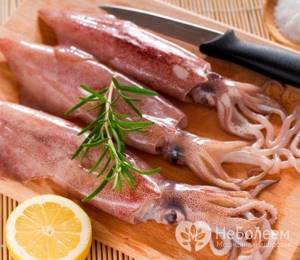
Children whose diet contains this valuable source of pure protein have an impressive concentration, good appetite and phenomenal memory.
Benefit
Based on the BJU indicators of boiled squid and its chemical composition, we can conclude that the product is very healthy and can be included in the diet. The high protein content in squid allows you to quickly saturate your body and satisfy your hunger for a long time. It's worth noting that protein is important for dieters as it helps control appetite. In addition, this substance plays an important role in the body in the structure of muscle tissue.
Squid also helps improve heart and vascular health. This product is an excellent source of vitamin B12 and reduces homocysteine levels in the body. This, in turn, helps reduce the risk of stroke and heart attacks.
Omega-3 and 6 fatty acids are of great importance for the body. They can help protect a person from the formation of cancerous tumors and the appearance of rheumatoid arthritis. Additionally, preliminary medical research suggests that these fatty acids may improve memory and improve mood.
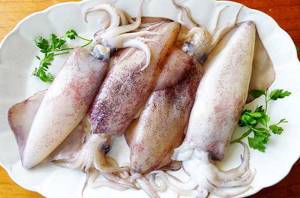
B vitamins, which are abundant in boiled squid, also have a beneficial effect on memory functions and brain function. Regularly eating squid in small portions can relieve mental stress and improve brain performance.
Squids also have a good effect on the functioning of the thyroid gland. Iodine and phosphorus improve the condition of the endocrine system, which, in turn, has a beneficial effect on hormonal levels and protects against the development of various diseases.
In addition to the above, boiled squid reduces cholesterol levels and tones the entire body. Its general strengthening properties make it possible to strengthen the immune system and provide the body with a charge of energy for a long time.
Benefits for men
Eating shellfish also has a positive effect on the health of young people. Here are the valuable properties of squid for them:
- Increased sexual activity (shellfish is considered a natural aphrodisiac).
- Improving the functioning of the genitourinary system.
- Increasing testosterone levels.
And, of course, regularly eating squid promotes active muscle building. That’s why this seafood is so loved by athletes. Not only men, of course.
How to cook properly?
Having learned how much protein is in 100 grams of squid and what the benefits of this product are, you can pay attention to the specifics of its preparation.
In fact, everything is very simple. To boil squid, from which you can later make an amazing appetizer or original salad, you will need:
- water – 250 ml;
- squid – 500 g;
- salt – 2 pinches.
First, the shellfish must be cleaned. The skin can be removed with one movement of the hand if you first pour boiling water over the squid. Then the mollusk needs to be cut lengthwise and the chord with the remains of the entrails removed.
It doesn't even need to be cooked over a fire. You just need to pour boiling water over it twice, leaving it for 10 minutes each time. Just add salt first and stir it.
Then it will need to be cut in half lengthwise, separating the tail fin. Remove the thin film from the outside of the pieces - without it they will be softer. And you can cut it for further use.
Dried
The further you go, the more calories you get. It is not without reason that those who carefully monitor their diet eat mostly boiled food. Jerky, dried or salted foods have too many calories. Dried squid contains as much as 237 kcal in 100 grams, and the BJU is 62g/2g/5g. And the seasonings used reduce their benefits. Salt causes water retention, which leads to swelling. The body is not washed away from toxins and accumulates toxins.
